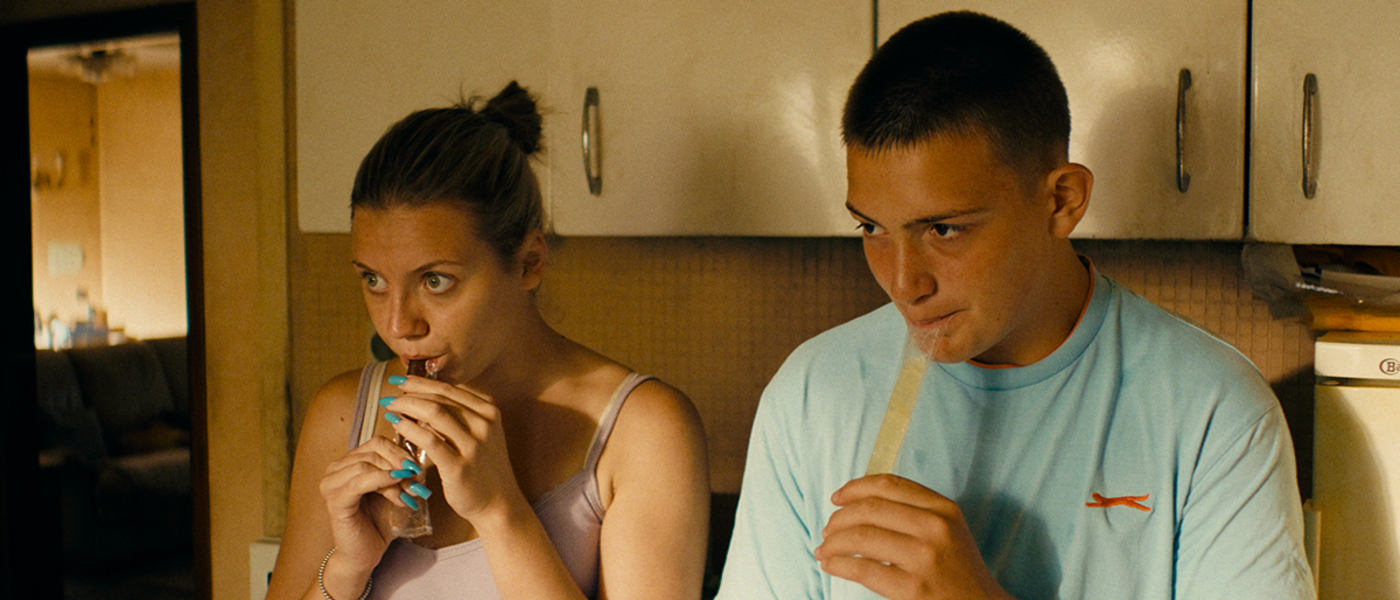About It's raining in the house
by Perrine Quennesson

by Perrine Quennesson
Interview with Paloma Sermon-Daï
There seems to be a throughline between your short film Makenzy, your documentary Petit Samedi and It’s Raining in the House…
Absolutely. I wanted to plow this Walloon furrow, so to speak. My graduation film, Makenzy, and my documentary Petit Samedi, were shot in the region I grew up in, in Sclayn. In the first film, I followed my characters when they were children, and in the documentary, as adults. For my first narrative film, I wanted to work on adolescence. Even if I usually combine fiction and documentary in my work - for instance in my documentary, I clearly staged several segments - I kept feeling somewhat frustrated. Petit Samedi is a family film that required me to be very ethical and respectful towards what my mother and brother shared. It was some sort of protection for them and for me. That being said, I wanted to share more about myself, and fiction makes it possible. It’s Raining in the House is a mix of my own adolescence and that of my actor’s. We’ve had the same experience as teenagers in Wallonia, but I don’t think that I’d have the freedom if I had made a documentary.
As you were saying, your first two films were shot in Sclayn, here we’re by the Eau d’Heure lake. What prompted you to explore that part of Wallonia?
I didn’t really want to go back to the village. And also to protect myself and my actors, Makenzy and Purdey Lombet, because, since there’s nothing to do there, there’s always a lot of people wandering about. I wanted to bring them somewhere else, to bring them into the story. I had to separate them from their own daily routine and that of the characters. And as a Walloon, you always go to the Eau d’Heure lake. It’s a well-known spot for tourists. It is also a place that embodies very serious social inequalities. Great hotel investment groups from the Netherlands live alongside students doing odd jobs to make ends meet, and even dabbling in larceny. It’s a very poor area with a two-tier system. On the one hand Dutch tourists indulge in water sports and live in American-style wooden houses. On the other, locals - Walloons - gather on unsupervised beaches and avoid this type of tourism because they don’t feel they belong. The lake turned out to be an ideal setting for my story.
How did you work with your actors, all of whom are amateurs?
I worked with them for a year before we started shooting, especially Makenzy and Purdey, and that really helped flesh out the writing. My story inspired them, and their story inspired me. It is true that, apart from my short film Makenzy, they had no real acting experience. So we had to start from scratch. I had to learn, as they did, because I didn’t study directing but photography, so I trained to use the camera and lighting rather than actors. We had them take some acting classes, but we quickly stopped because they’d come back with preconceived ideas about acting and what I like about them is how natural they are, they’re diamonds in the rough. We worked on instinct together.
We should point out that Purdey and Makenzy are members of your family…
We call it the Walloon package (laughs). Purdey is my stepbrother’s daughter and Mackenzy is Purdey’s stepbrother. Ain’t nothing but a family thing. That’s also why I kept their first names. The characters were supposed to be called differently, but they would always get it wrong because they’re very instinctive. And after a while I thought “Okay, this documentary part of the film is going to stay.”
You chronicle a summer using very potent and surprising changes in tone; how did this type of storytelling come to you?
I think it came from our way of shooting. Production got a 400,000€ subsidy for light production from Belgium. It’s really a very low budget given what we had to do, and we quickly decided to take it as an opportunity and not a drawback. So we had to streamline. And I think that’s also what created the elliptical nature of the film. We quickly realised that we weren’t going to have 20,000 settings, not thousands of secondary characters, so we had to go to the core of the matter. Belgium has a long history of social films, but what always bothered me is that it can sometimes be heavy and dark. I wanted to bring a fresh outlook, to make a radiant film in which you can laugh or cry at the drop of a hat. These shifts reflect who I am and how I envision film, a way to make a certain social reality, a social standpoint your own. The film isn’t about being poor, poverty is the backdrop of the film. What comes out is above all the relationship between sister and brother, that glass ceiling, which I’ve experienced and which is so hard to break.